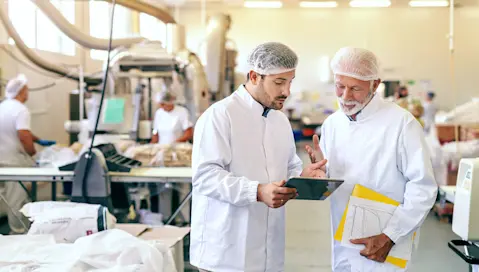En vedette dans cet article
The Ultimate Guide to Food ERP
The Ultimate Guide to Food ERP
17 Juin 2021
Jack Payne
As a food and beverage professional, you’re in the thick of a complex and fast-moving industry. From changing consumer trends and increasing regulatory demands to the massive quantities of products moving through your facilities every day, there’s too much for one individual—or even a team of employees—to keep up with on their own.
That’s why businesses like yours are looking to technology to solve their biggest challenges and keep them competitive in this dynamic marketplace. Robust analytics, excellent tracking and tracing of materials throughout the supply chain and highly accessible cloud-based platforms are becoming must-haves to keep operations running smoothly. If you’re going to ensure safety, efficiency and profitability, you need the most advanced systems on your side.
At the heart of this push toward digital transformation are enterprise resource planning (ERP) solutions, which serve as the integrated foundation for companies that grow, process, manufacture or distribute food and beverage products. Of course, not all of these systems are alike, and it’s the purpose-built and industry-specific offerings that stand out from the pack and boost organizations like yours forward.
A specialized food and beverage ERP can be the jet fuel that propels your business onward and upward. If you’re looking to flip the switch and engage those thrusters to accelerate your progress, you need to understand just what such a system can do for your organization.
That’s why this guide is laid out to cover all the basics of food ERP, including the signs that your business might need such a solution, the benefits of implementing one across your facilities, the unique features they offer that are tailored to your processes, and how you should go about selecting the system that’s right for you.
First, though, let’s define food ERP in plain terms.
What Is Food ERP?
A food ERP solution is an integrated software platform that elevates the management and performance of food and beverage businesses. It’s no exaggeration to say that an ERP system connects all of your departments—from accounting and scheduling to production and quality assurance—to act as a single source of truth for your entire organization. Ensuring everyone has accurate, consistent data, exactly when they need it.
ERP offerings that are designed specifically for food and beverage companies are a cut above in terms of the facts and figures they can capture, update and compile automatically. With real-time metrics and integration with Internet of Things (IoT) and AI-driven devices, you always know what’s being used where and in what quantities, how efficiently your processes are running and what your inventory levels look like.
This reliability and accuracy of information collection is crucial for food traceability and puts you firmly in control when it comes to one of the industry’s most critical challenges. Consider that 46% of supply chain businesses reported improved customer service and demand fulfillment thanks to their use of data analytics, and 41% had faster and more effective reactions to supply chain issues.
And the industry-specific benefits don’t stop there. Better allergen and expiration management, compliance with industry standards, adequate labeling and product consistency can all be unlocked with the right food ERP.
Using manual record-keeping methods that differ from team to team internally is no longer an option for organizations that want to keep pace with a sector that’s moving quickly. It might sound too good to be true, but a single smart solution for managing all of your operations really is here in the form of food ERP.
What Kinds of Businesses Can Benefit from Food ERP?
Whether your business focuses on farming, packing, processing, manufacturing or distributing food and beverage products, your organization stands to benefit from food ERP.
As a single unified platform that integrates all of your data and provides actionable insights in real time, you’ll be able to identify inefficiencies in your processes—no matter what they are—and make improvements that boost your productivity and bottom line.
Likewise, ERP solutions also deliver results for organizations across the spectrum of food and beverage sectors, including fresh produce, meat and seafood, dairy, bakery, confectionery, sauces and dressings, spices and ingredients, frozen and prepared packaged foods, beverages, and snacks.
Built-in functionalities for labeling, compliance and quality assurance are vital for companies of all kinds, and features for consignment tracking and allergen management are difference-makers in certain sectors. Food ERP software supports all of your unique needs.
Signs Your Business Needs Food ERP
Early on, many food and beverage businesses rely on pen and paper or basic bookkeeping software to conduct their day-to-day procedures and transactions. As an organization grows, though, these methods aren’t able to scale with it, and it becomes more and more difficult to really figure out what’s working and what’s not. And almost impossible to keep up with evolving consumer trends and regulations.
While putting a food ERP solution in place can be an involved and complicated journey, it’s unwise to put it off if your organization is already experiencing some or all of the following issues:
Data discrepancies – When the answers to critical questions are different depending where you look and who you ask, you know you have a problem. There should be only one version of the truth.
Low yields, high waste – If this is an issue, there’s likely an inefficiency in one of your processes that needs to be addressed. You need to dig in and find the root causes to make sustainable improvements.
Poor customer satisfaction – Should your product quality slip or shipments get delayed or missed, your brand reputation will suffer. If you’re not meeting expectations, you need the right data to find out what’s going wrong.
Lack of demand forecasting – Without reliably accurate projections, you can be left with unsold products that will go bad, representing a serious loss. Without effective planning done ahead of time, you’ll face the same issue time and time again.
Decreased sales performance – Plain and simple, your salespeople can’t do their job if they don’t have the information and materials they need. You’ve got to have a solution that facilitates their responsibilities with flexible, instant access.
Uncertainty surrounding potential food safety emergencies – If you’re not assured that you could successfully handle a product withdrawal or recall, that absolutely must be rectified. Those aren’t the situations in which you can afford to scramble.
The longer a food and beverage company relies on outdated procedures, the further behind it will fall in keeping up with its competitors and grabbing consumers’ attention. The age of purpose-built food ERP systems is here, and now is the time to revolutionize the way you do business with the technology of the future.
The value of reliably accurate information becomes clear when you consider that 46% of supply chain businesses reported improved customer service and demand fulfillment thanks to their use of data analytics, and 41% had faster and more effective reactions to supply chain issues.
The Benefits of Food ERP
It bears repeating: putting a food ERP system in place at your food and beverage organization will have positive impacts across the board. The platform will allow all of your employees to carry out their responsibilities with precision and in alignment with your key initiatives.
Here are just a few of the profound effects that a food ERP can have:
Streamlined processes – Use automation and an intuitive digital interface to simplify workflows and accomplish more in less time.
Elimination of information siloes – With an integrated, cross-functional platform, everyone has access to the facts and figures they need.
Uncompromising bidirectional traceability – Collect all necessary information at each stop along the supply chain and update your database with any relevant changes automatically.
Higher yields – Leverage full control over formulations and robust visualizations to get the most out of your production lines.
Excellent food safety and recall readiness – Comprehensive tracking of materials and products means you never have to scramble in the event of an incident.
Assured regulatory compliance – Automate your checks and inspection scheduling to make sure your operations are always running according to the latest standards.
Enhanced agility to capitalize on opportunities and avoid emergencies – Real-time reporting lets you make informed decisions on the fly.
Greater efficiency through data – Identify the snags in your processes and correct them with robust analytics.
Cloud-based deployments – Unlock the flexibility of access and cost savings that are facilitated by implementing your ERP from the cloud.
Better consumer experience – Ensure more consistent, high-quality products are delivered on time with visibility into key metrics.
Reliable supply, sales and demand projections – Prepare for the future effectively with dependably accurate forecasts.
The transformative effect of a successful ERP implementation makes the initial investment well worth it, with most companies seeing a return on investment within nine months. Meanwhile, your organization can continue to expand operations and product lines knowing that you’re ready for the next challenge, the newest consumer trends, possible shifts in regulation and whatever else the future may hold.
Food-Specific Functionalities You Should Look for in Your ERP
Advanced food ERP systems—like Aptean Food & Beverage ERP—boast features that are tailored specifically for food and beverage businesses—bringing you specialized benefits even beyond those listed above. But what exactly should you be looking for?
While the specific combination of features you prioritize is likely to be unique to your business, there are some functionalities that are key in particular verticals or types of organization. For example, any food and beverage business that deals with seasonal fluctuations in supply and demand will find forecasting tools handy for preparing for the future. Let’s take a look at a few other examples.
Fresh Produce Businesses
Consignment tracking is especially important for farmers and fresh produce companies, so selecting a solution where this functionality comes built-in should be high on your list. Fresh produce organizations also need good demand forecasting tools to make sure that they always have sufficient inventory on-hand but also minimize waste.
Bakeries
Bakeries and other food processing and manufacturing organizations will find the traceability and allergen management tools of food ERP software especially useful, as these enable you to effectively monitor your materials, products and lines and dig into the details of issues when they arise.
Dairy Producers
Dairy companies, on the other hand, are particularly well-served by the integrated, real-time metrics that ERP offer when tackling that sector’s complicated costing challenges. It can be difficult to assign a class to your raw milk when it is received, as you may not yet be sure what it will be used in, so you need the flexibility to modify that characteristic once you have more information.
Recipe-Based Manufacturing
Recipe and inventory management are crucial for sauces and dressing manufacturers, so they’ll appreciate the ability to fine-tune their formulations and monitor ingredient levels to achieve excellent product quality and optimal levels.
Meat, Poultry and Seafood Businesses
Meanwhile, meat, poultry and seafood businesses will benefit from catch weight management features, as well as integrations with smart sensors that can help identify product class, grade and other information.
With a generic ERP platform, you’d likely have to pay extra to customize the interface with these features. Instead, choosing a food-specific ERP allows you to access some of these features as standard. Aptean’s food ERP software for example, offers all the above and more as soon as it’s implemented, allowing your company to start reaping the rewards straight away.
Finding the Food ERP That Fits Your Business
If you’re ready to start searching for the right food ERP solution for your organization but are unsure of how to get the process started, use these steps to map your road ahead:
1. Assemble a Team
Create an internal team dedicated to the task. While you should select those employees most qualified for the task, it’s also important to involve people from several departments to get widespread buy-in. So aim for a diverse mix of folks and make sure your leadership team maintains excellent communication with all staff whether or not they’re a part of this core group.
2. Identify Your Needs
You know better than anyone what your company does and what is most vital to your success. It’s worth putting considerable thought and time into the creation of a list of desired functions and features, as the decision of which food ERP to choose is not one you’re likely to make often.
3. Create a Vendor Matrix
A “vendor matrix” can serve as a scorecard for the various vendors you’re considering. That will allow you to compare your options side-by-side based on how they fulfill—or don’t—your requirements. The research you do in order to complete this step will be invaluable, as you’ll learn what sets certain offerings apart from the rest.
4. Craft the Request for Proposal
Once you’ve narrowed it down to your top choices, you’ll need to spell out exactly what you’re looking for in a formal and thorough request for proposal (RFP). You should include your vendor matrix so that it’s clear how submissions will be judged but still keep the document as succinct as possible so as to set clear expectations for the providers.
5. Invite Vendors to Demo
Select your top vendors, usually between five to eight, and extend the offer to them to give your team a thorough demo of their product. Make sure to actively take notes and ask questions, as this will be your best chance to understand how the system works and what it will mean for your operations should it be implemented.
6. Come Together as a Team and Decide
Finally, with the additional information gathered from the demos, your entire leadership team will need to narrow down the candidates and then make the most informed decision possible. Consider the cultural fit between your own organization and the vendor, as you’ll be working closely together with their team throughout the implementation process. And don’t forget to keep your own employees well informed on your goals and their roles in reaching them.
Why Choose an Aptean Food ERP?
With decades of experience providing solutions for food and beverage businesses, Aptean knows the industry inside and out. We’ve designed our industry-specific food and beverage solution, Aptean Food & Beverage ERP, based on this extensive knowledge, and our team is ready to help you get fully up to speed with the tools and functionalities most critical to your operations.
At Aptean, we partner with our customers to meet their long-term needs, assisting with all system updates and, in the case of cloud deployments, maintaining the platform from afar. What’s more, our solution is built on the Microsoft Dynamics 365 platform and seamlessly integrates with other Microsoft applications—including SharePoint and Outlook—giving the interface a familiar and welcoming feel for users.
“The main thing for us was the level of relationship that Aptean has with Microsoft,” says Robert Naugle, plant manager at Vita-Pakt. “Aptean Food & Beverage ERP is completely integrated and compatible with Microsoft products now and down the road. We ultimately decided that the functionality of Aptean Food & Beverage ERP fit us better than other ERP systems would.”
"Aptean Food & Beverage ERP is completely integrated and compatible with Microsoft products now and down the road. We ultimately decided that the functionality of the solution fit us better than other ERP systems would."
Regardless of which food and beverage sector your organization operates in, our dedicated team has the in-depth understanding to get you where you want to go.
"We selected Aptean to aid us in this process because they are specialized in this type of work in the food industry. They were able to give clear recommendations on which steps to take in which order," says Milou Klooster IT Manager at Vishandel Klooster. "Aptean continues to help us complete stages of automation and enables us to expand in order to be able to grow.”
If you want to hear more about Aptean’s best-in-class ERP solutions for food and beverage businesses like yours, reach out to us today and get Ready for What’s Next, Now®.
Related Blogs


Prêt à transformer votre entreprise ?
Nous avons les solutions ERP spécialisées dont vous avez besoin pour relever les défis de votre secteur.






